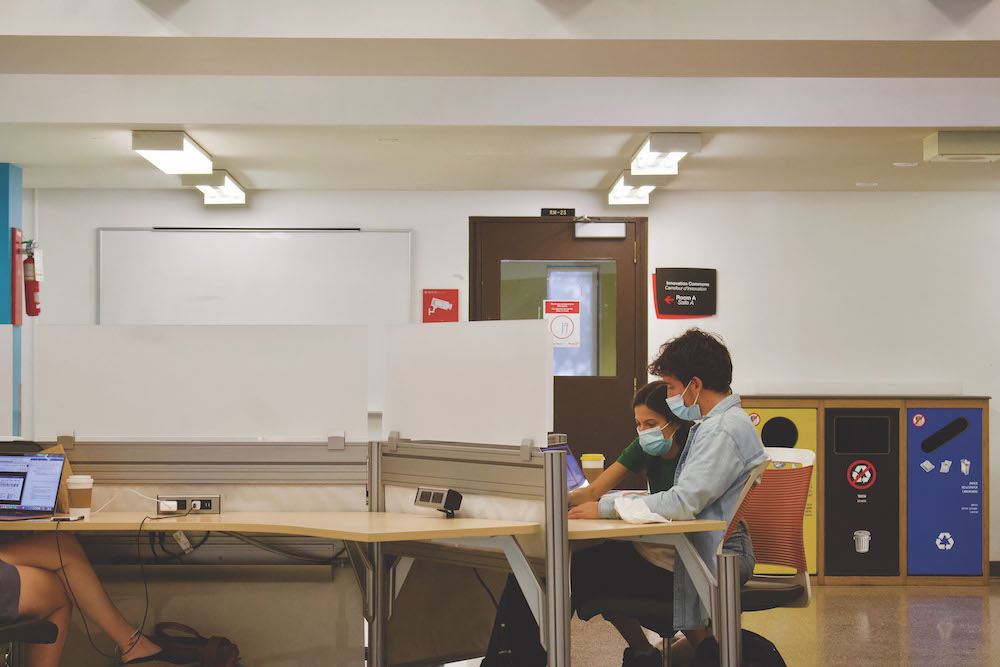On Sept. 17, McGill sent an email announcing that students will need to present their Quebec COVID-19 vaccine passport to enter any on-campus library—beginning in mid-October. The announcement came three weeks into the Fall semester, amidst demands from McGill students and faculty to implement stricter COVID-19 protections. The Students’ Society of McGill University (SSMU) drafted an open letter and staged a protest on campus demanding a vaccine mandate, online accommodation for all classes, the prohibition of mandatory attendance, and a commitment to including student representatives in COVID-19 related decisions. Although McGill’s new library policy is a step toward protecting students, it is also proof of a disorganized and backward approach to vaccine requirements. McGill should instead enforce a university-wide vaccine mandate instead of haphazardly patching up the gaps in their own policies.
Whereas many Canadian and American universities have implemented a vaccine mandate, McGill has not. The university has argued that the Quebec government’s vaccine passport provides enough incentive for students to get vaccinated and that a university mandate is beyond their legal jurisdiction. But despite McGill’s efforts, alongside the province’s hefty lottery incentives, cases and hospitalizations have risen within and beyond campus. During the first week of class, McGill reported six COVID-19 cases on campus with no community transmission. Just one week later, that number tripled, rising to 18, and the week after that, the McGill community was alerted to 13 cases with possible community transmission in the McIntyre building. This rise in cases is not surprising, given that students are returning to in-person classes and student life, parties, and large gatherings for the first time in almost two years. McGill should have predicted the spike in cases and should have mandated vaccinations for all students, faculty, and staff at the beginning of the term. An all-encompassing mandate would be less confusing, and it would have set clear rules and standards from the start. It would show that McGill is prepared to guarantee students’ safety during the return to in-person learning.
Although the vaccine requirement for accessing libraries is a welcome step, it does not protect students from transmission in their classes, especially considering the fact that masks are not mandatory for instructors. McGill’s patchwork approach leaves students confused as to where they need to show proof of vaccination, and what the rules are—there is no established standard delineating which spaces and activities require proof of vaccination, and which do not. Not only are there ambiguities, but there are also logical inconsistencies: A passport is required to attend sporting events, but not to live in residence. Similarly, the decision to require vaccine passports in libraries, but not in other spaces was not a matter of coherence for the administration; instead, it was a matter of pressing firmer COVID-19 protocols while avoiding implementing a school-wide vaccine requirement.
Furthermore, the university’s vaccine verification procedures have been inefficient, considering the long lines outside of dining halls, where students wait to get their vaccine QR codes scanned. Library lines, too, risk becoming very long because of the sheer number of students that go in and out every day. Considering the amount of time McGill has taken to make this decision, the administration needs to present a plan for a more efficient system. Furthermore, as colder weather settles in, students will begin to migrate to indoor spaces, spending more time in higher-risk areas such as dining halls and libraries. Additionally, many speculate that library capacity limits will increase once access is restricted to those fully vaccinated, or that people will be allowed to take their masks off while studying. If the capacity does not increase, how the university will deal with rising demand in study spaces remains unclear.
McGill still has some time to figure out the logistics of the new policy, but the administration should be prepared to answer questions and address the concerns of its students before they ask them to comply.








